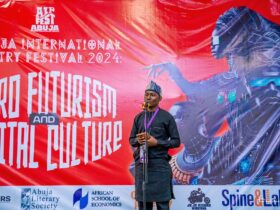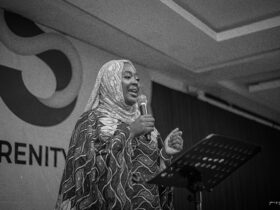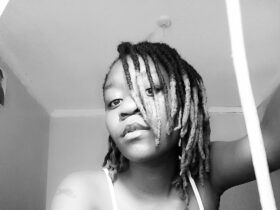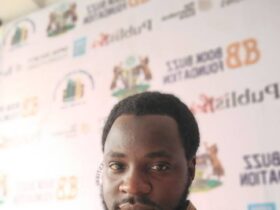
Image by KB Mpofu
Konya Shamsrumi: What is the process of writing a poem like for you? Is it a lot of hard work or easy?
Tinashe Tafirenyika: The process begins with an idea, a thought, a random philosophy. It can come as one line or an image or a word. I then obsess over the idea, let it drive me all sorts of crazy, until it is fully formed, until I understand it. This could take anything from ten minutes to two years. When I find “it”, the fully formed version of the idea, I just know, and then I can begin to write. If I try to write before the idea is formed, it neither sounds nor feels right. Most times the unformed idea is just plain simple trash, incomplete and deformed, painful to look at.
I am impatient and stubborn, my writing process demands patience, this makes writing very hard work for me. There is a great deal of internal conflict involved, copious amounts of coffee and a lot of insomnia (probably due to all the coffee). But every poem, once it’s out there, communicating someone’s truth with people responding to it, it is worth all the pain.
Konya Shamsrumi: Please describe your sense of identity in this or any possible world in imagery or metaphor?
Tinashe Tafirenyika: That one is complex, my poetry consists mainly of me trying to figure it out.
What I do know, so far, is I am a circle trying (well, I am trying much less these days) to fit into a series of squares. There is no place for me in the world (harsh truth, seeing as there’s not that many inhabited planets in this corner of the galaxy). People that look the way I do, are from where I am from, talk like I do, do not belong. On the few occasions that we are given a place, it is at the very bottom tier. Because I don’t really belong anywhere, I have taken to carving my own circular spaces into the world, making my own place. Like writing, it is hard and often unfruitful bt it is very disruptive to the status quo and I must say, I find that bit tobe quite fun.
The good thing about being the circle, the underdog or outcast, is that no one really has any expectations of you. If you fail, you were set up to fail anyways so boo-hoo. But if you succeed, you’d have changed that one corner of the world into
Konya Shamsrumi: If any of your poems could literally save a person’s life, which poem would it be and can you describe the person whose life you think it would have saved?
Tinashe Tafirenyika: I’d say Sarah Baartman. I wish I had heard it when I was younger, it definitely would have saved me a great deal of pain. So I suppose it would save a younger version of Tinashe who was frustrated with the way the world is and how it looks at her. It would let her know that she is not the problem, the world is,and it’s ok that she is the way she is. Part of the most humbling experience of releasing the Sarah Baartman video was having twelve-year-old girls come to me and say how the poem had changed the way they look at themselves. I know that’s not “saving a life” in the Wonder Woman sense, but I suppose that is as close to being a super hero as any poet can get.
Konya Shamsrumi: What does Africa mean to you, as potential or reality?
Tinashe Tafirenyika: As a reality it is home, more than anything. As a potential, it is the future, particularly in arts and culture. There is so much untapped potential as far as African stories and experiences are concerned, I am excited to see that blossom in the coming years as we claim our place in the world with our own version of events.
I know a lot of people believe that besides slavery and colonialism, the shrinkage of the world into a global village has contributed immensely to the erosion of African culture and traditions. That is true, and it is also true that this has caused us to guard whatever is left very jealously. As Africans, we now understand the significance of sharing our story using our voice without counting on someone else to do it for us and that is how we win, by constantly rediscovering ourselves and choosing our own identity.

Image by Tswarelo Mothobe
Konya Shamsrumi: Could you share with us one poem you’ve been most impressed or fascinated by? Tell us why and share favorite ines from it.
Tinashe Tafirenyika: ChapterTwo of Kahlil Gibran’s “The Prophet” is Everything! I read it all the time, I have never heard anyone describe love so accurately and with such simplicity and depth
“When love beckons to you, follow him,
Though his ways are hard and steep.
And When his wings enfold you yield to him,
Though the sword hidden among his pinions may wound you.
And When he speaks to you believe in him,
Though his voice may shatter your dreams as the north wind
lays waste the garden.”
With a belief that art is a catalyst for change, Tinashe Tafirenyika has disrupted the Zimbabwe Poetry Scene. In 2017 she became the first woman and youngest person to receive a National Arts Merit Award (NAMA) in Spoken Word Poetry in Zimbabwe. The same year she also received a Bulawayo Arts Award (BAA) for her poetry.
In 2018 she became the only person to have won a NAMA twice in the Spoken Word Poetry category. She released her first poetry video, “Sarah Baartman” that year.
When not stringing words together Tinashe practices as a Medical Laboratory Scientist in her home town, Bulawayo, where she is based.













Leave a Reply